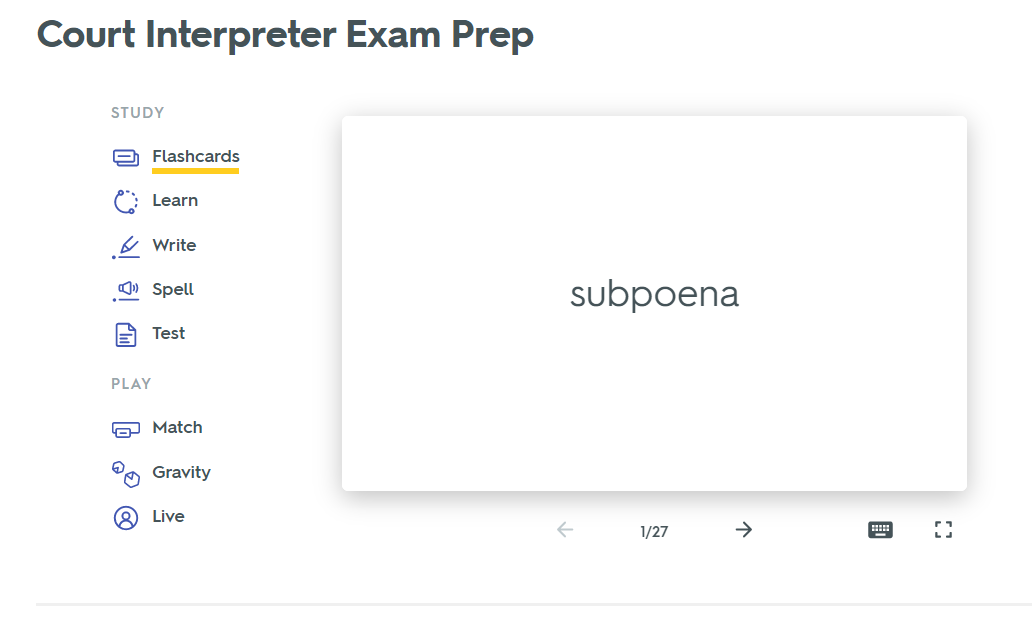I’m not sure where this drawing is from but from time to time it makes rounds in various interpreter groups on social media. Aside from being funny, the image captures the true nature of the interpreter profession: it’s a highly-skilled job. Being a good interpreter involves well-developed listening and speaking skills, a strong memory, note-taking skills, sound knowledge of the code of ethics in your chosen field(s) – and being the proverbial embodiment of a walking dictionary.

It’s certainly true that no one can know ALL of the words related to a particular subject – after all, the English language contains roughly 1 million words, and most adult native English speakers have a vocabulary which includes only a fraction of that – about 20,000–35,000 words. However, interpreters must possess a professional vocabulary that encompasses a wide variety of terms they can expect to encounter on a daily basis, be it medical, legal or political terminology. The building of your glossary starts when you begin preparing for certification exams and stops… well, never. It never stops. Even the most knowledgable and experienced interpreter will encounter new words and expressions or will need to prepare for a new kind of assignment. So, as interpreters, we need a way to work with our personal glossaries: organizing terminology, learning it, revising it, and sharing it with others. This blog post will suggest some options for glossary management.
Pen-and-paper glossaries
I’ve always been a proponent of old-school – that is, pen and paper- learning. When preparing for a written exam for Cambridge DELTA (Diploma in Teaching English to Speakers of Other Languages), I had stacks and stacks of index cards that I carried around in ziplock bags and whipped out at every opportunity. Aside from terminology, the index cards contained short summaries of teaching approaches, the pros and cons of various teaching techniques, and other information I needed to commit to memory in order to pass the intense Module 1 exam. I really enjoyed making the cards – I liked writing things down, making the cards neat and pretty with all the bullet points and pretty cursive handwriting. In the run-up to the exam, I had my husband, friends and colleagues quiz me, and I studied between teaching classes and while waiting for the bus. These cards served me well, but, unfortunately, these index cards were some of the things I had to leave behind when we left Turkey where we had lived at the time. Here’s the thing about paper – it weighs a lot!



Speaking of Turkey – for learning the Turkish language, I used a similar approach, except instead of single-word index cards, I would make vocabulary lists. I would divide a page into two columns, Turkish in the left and English on the right, fold it in half and voila – a nice and long index card with lots of words and phrases on it. A lot more efficient in terms of space and weight, and once again, it worked really well for me. But where are these pages now? I have no idea – they gradually got scattered around my office at Meliksah University, where I worked at the time, slowly found their way under the bed and the sofa in our Turkish apartment, with some meeting an untimely end squashed at the bottom of my purse – until they all mysteriously disappeared.
When I started preparing for my medical interpreter certification exam, I tried to do what always worked for me – a pen and paper. I bought a nice notebook and spent several pleasant hours dividing it into sections according to topics, using my nicest pens and fancy divider stickers. This notebook is much more long-lasting than single-page vocabulary lists and better organized than ziplock bags of index cards. When I need to refresh my memory before an assignment, let’s say, in cardiology, I can find the appropriate section in the glossary and go over the terms. Similarly, if I’m preparing for an assignment that’s new to me, I can add some terms to a section or start a new section. In addition, when I encounter unfamiliar or useful words or phrases when out on an assignment, I make a note of them in the margins of my note-taking notebook and later transfer them to an appropriate section in the glossary notebook.


So, I’m definitely keeping the notebook – but I’m keeping it at home. I found that carrying it with me adds weight to my already hefty purse – as a freelance interpreter who spends her day traveling between various appointments, my bag is filled with essential supplies – paperwork, pens, snacks, chargers, portable laptop, a book, hand sanitizer… In other words, I wanted a way to make my glossaries more portable, and also collaborative.
Quizlet

Enter Quizlet. Quizlet is a mobile and web-based study application that lets you create and study vocabulary lists and flashcards. A basic free account will allow you to create study sets (sets of flashcards), and organize your study sets into folders. You can then study the terms and test yourself. You have options of studying the flashcards as if they were real paper cards – that is, looking at one side and then tapping the card to flip it to another side (and you can choose which side you see first – e.g. term or definition, English or target language). You can also play games and test yourself – there are several options for each which include matching and having to type in the answer.
When you add a term, you can add its definition and/or equivalent in another language, and/or a picture or a diagram.


You can also decide to make each study set public, visible with a password, or only visible to you.
So, why Quizlet? There are several things that make it an attractive option for glossary management – even if it is not your primary way of recording terminology and, like me, you also want to maintain a physical copy or keep a more traditional-looking table-based digital glossary in, say, Excel or Google Sheets.
- When you use the Quizlet app, you always have your glossary on hand. This way, you can add new terms immediately. You can also study on the go – whether you need to memorize new terms to prepare for an exam or interpreting assignment, want to refresh your memory in a particular area, want to test yourself to see how well you remember the terms or even need to kill a few minutes as you wait outside a doctor’s office.
- Another cool feature is that you can let another user edit your study sets by adding cards! I recently took advantage of this with my friend Genya, a fellow medical interpreter who is also preparing for a court interpreter exam. I created a study set called Court Interpreter Exam Prep where we record English legal terminology and its Russian equivalents. The words we add come from targeted studying of textbooks and online materials, as well as court-related expressions we encounter in TV shows like The Good Wife or reading court drama-type books (I’m currently on a Michael Connely streak that started with the Lincoln Lawyer). Similarly, I started a study set which I call Random Medical Terminology where I add words that I encounter during interpreting assignments or when I read books, listen to podcasts, or watch Grey’s Anatomy for the umpteenth time. I shared this study set with a group of my Russian interpreter friends so that we can all add to it.
- You can also search for study sets created by other users and add them to your folders. If you don’t know the user who created a study set, make sure to look through it for accuracy.

Here are some tutorials for using Quizlet:
- How to create, edit and study flashcards
- A YouTube video explaining how to use Quizlet
Other ideas for glossary management:
- Reverso dictionary and Reverso context, a reference tool in English and French, Spanish, Italian, German, Russian, Chinese, and Portuguese will let you save your search history and build a phrasebook if you register (free)
- Ideas for terminology management for interpreters from the Terminology Coordination Unit of the European Parliament.
- Tips for organizing your glossary from Michelle Deeter, a Chinese-English translator and interpreter
- A few ways to make your glossaries future-proof by Alexander Drechsel
- Android App: Memento for terminology by Alexander Drechsel
- Interpreter’s Help – a glossary management solution with both free and paid options
- Not Your Mother’s Latin: Honing Your Medical Terminology for Medical Interpreter Certification By Marjory A. Bancroft and Katharine Allen
- Recording Vocabulary + Terminology using databases
Glossary Resources
And now that you have some ideas on how to manage your glossaries, here are some ideas on where to find glossaries. I already mentioned some routes by which terms and expressions make it into my glossary – such as targeted studying (for example, here and here are some resources for healthcare interpreters), but also words and phrases encountered on the job and on TV and in movies/books and other media. In addition, here are some resources for glossary building.
- Glossary Links is a glossary search tool with a database of more than 8,000 glossaries from the Terminology Coordination Unit of the European Parliament.
You can find glossaries according to topics and by language. The glossaries cover a wide range of domains like, for example, legal affairs, environment, medicine, consumer protection, human rights, economy, and many others - Terminology resources by Kelly (Grzech) Henriquez
- A list of various glossaries from the International Medical Interpreter Association (IMIA)
- Certification Commission for Healthcare Interpreters (CCHI) Mini-Glossaries for Interpreters
- A large collection of medical and legal glossaries from Valley Community Interpreters
- UN interpreter glossaries
- Legal glossaries and dictionaries from the National Center for State Courts
- Federal Court interpreter orientation manual and glossary.
Featured image: image by upklyak on Freepik.
More about the author: About Yuliya Speroff
More Resources for Medical Interpers
For a list of podcasts related to medicine in English, see here.
For recommendations for TV shows medical interpreters, click here.
For recommendations for Russian-language podcasts and medical books click here and here.

Leave a Reply